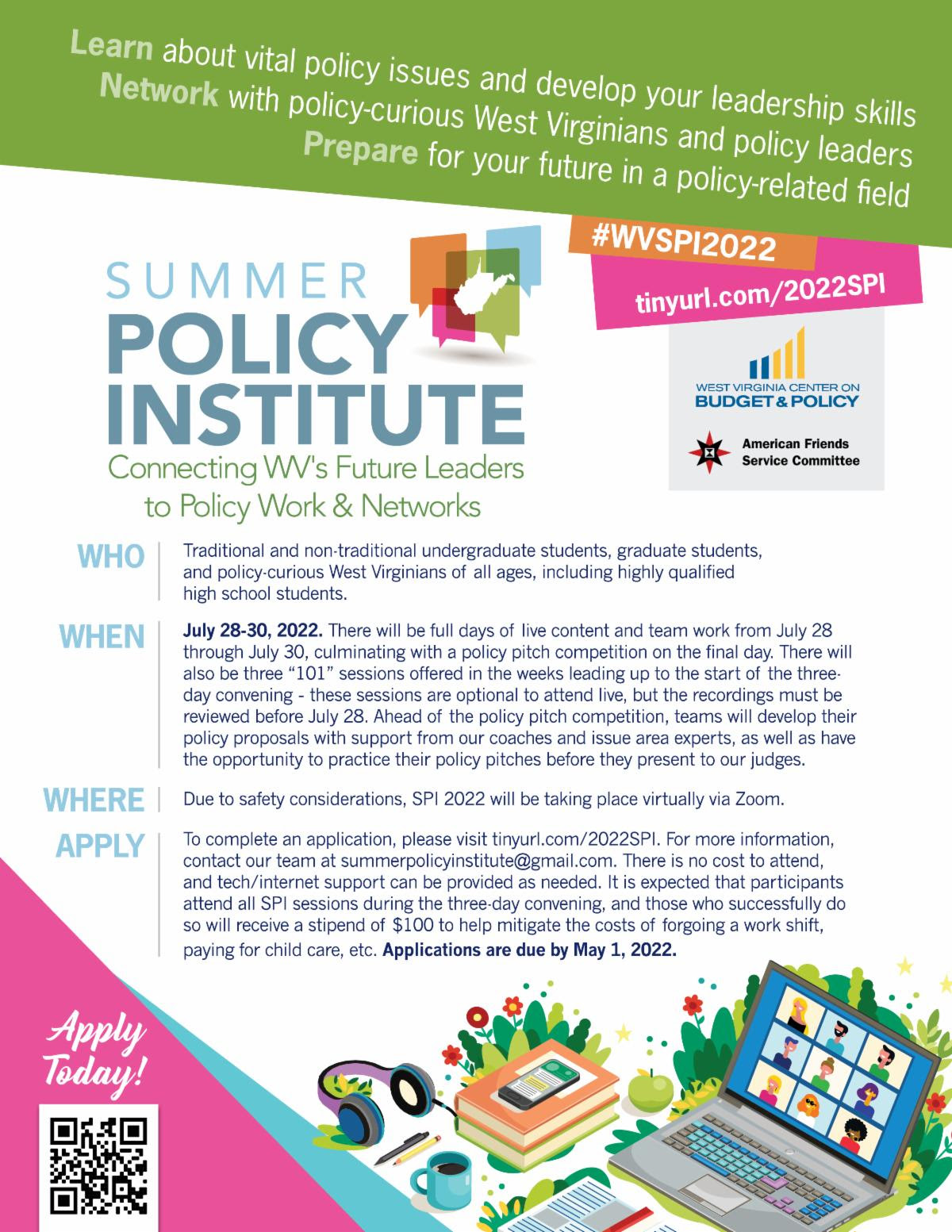The 2022 West Virginia legislative session was nothing short of a missed opportunity when it came to public health and the social safety net. Overlapping health and economic crises created the need and opportunity for the Legislature to focus on proactive measures that could prioritize the health and wellness of families across the Mountain State, but they failed to do so. Rather, legislators prioritized social issues masked as health issues – like curtailing public health related to COVID-19 and abortion access.
There were several bills relating to COVID-19 – none that made people safer, like paid sick days or paid leave. Instead, the Legislature turned its attention to undermining proven public health interventions, like mask mandates and other safety protocols.
Access to abortion in West Virginia is already minimal, with just one clinic still operating in the entire state. Despite this, at least a dozen bills were introduced that could further curtail access to abortions in the Mountain State. Of these, just one passed. SB 468 prohibits abortions if an individual indicates that they seek termination of their pregnancy because the fetus has a disability. This stands in stark contradiction to COVID-19 related “freedom” bills that asserted that the state could not interfere in one’s medical decision-making.
In contrast to the harmful COVID-19 and abortion legislation, several bills had the potential to positively impact West Virginians. Unfortunately, most were not passed this session. You can find select summaries in our full blog post.
On a positive note, lawmakers did pass a bill addressing behavioral health. SB 181 expands behavioral health services by designating crisis hotline centers, among other provisions. This is great news, as behavioral and mental health have been significant concerns within the state for several years, especially against the backdrop of the ongoing opioid and COVID-19 epidemics.
Finally, a bill was passed to split the Department of Health and Human Resources (DHHR) into two separate agencies. This move will create an additional secretary at the executive level, who the governor will appoint. Dividing such a large agency is not inherently disadvantageous for the state. However, concerns about appointments that do not prioritize best public health practices are valid. Further, arguably the most pressing concern associated with this bill is its timing. Set to go into effect by June 2023 – amid a public health crisis wherein several programs must return to pre-pandemic processes – such a policy could create a massive administrative burden within an agency already strife with critical staffing and funding deficits.
You can find our recap of the good and the bad health- and safety net-related legislation that passed and failed this year in Rhonda’s full blog post.

Our friends at Keep Your Faith Corporation and West Virginia Food and Farm Coalition have been working tirelessly for months in the pursuit of establishing a community grocery store to increase access to fresh, nutritious food for our neighbors on Charleston’s West Side. This is a perfect example of an effort being made by the community, for the community. A recent article highlights their work. Excerpt below:
The intentions for the grocery store go beyond promoting healthy eating, and includes using the SNAP Stretch program, creating job opportunities and providing counseling services to those in need. Alecia Allen works with KYFC and discussed some of the benefits the corporation brings to her community.
“The folks that we do have working to maintain employment and move their lives forward, if they need support, they’ll have that,” Allen said. “We’re excited about all those things.”
KYFC and the WV Food and Farm Coalition are seeking $366,000 from the city of Charleston’s American Rescue Plan funding to get the grocery store up and running. About $630,000 has been requested to expand the SNAP Stretch program. You can find a link to the full proposal here.
City council is expected to vote on the funding request next month.
“Either way it goes, I think we’re going to continue to push forward on what we’re doing in our food insecurity program,” Miller said. “It’s needed, and we see it. Regardless if the money comes or not, we’re going to continue on that mission.”
Read the full article here.

As the 2022 West Virginia legislative session approached its end, the House of Delegates prioritized setting aside hundreds of millions to fund personal income tax cuts in future years. They placed $265 million in the general revenue surplus section of their budget for this purpose. Governor Justice, however, vetoed this line item in the budget bill. A recent article, featuring insight from WVCBP executive director Kelly Allen, provides further details. Except below:
The governor signed the budget bill but exercised his line item veto power on what the majority in the House of Delegates meant to set aside for future tax relief.
The governor objected that a specific House bill to trim the income tax had not passed, so there was no corresponding legislation for the budget. That bill, House Bill 4007, was never taken up by the Senate.
The governor’s letter elaborated that “it would set a bad precedent to set aside funds for a purpose that the Legislature rejected. It would also set a bad precedent to appropriate funds to a fund for which there is no stated purpose, doing nothing to accomplish the intended goal but making the funds unavailable for an entire year.”
Like the governor, Kelly Allen, executive director of the nonprofit West Virginia Center on Budget & Policy, questioned setting aside millions of dollars in public funds for a possible future tax cut. She said the money could be put to better use to bolster current needs.
“If we hold onto taxpayer funds for years in the hopes of future tax cuts for the wealthy rather than investing now in things like child care and higher education that can help all families and grow our economy, shame on us,” she said.
Read the full article here.

The Summer Policy Institute (SPI) is an annual convening hosted by the WVCBP and the American Friends Service Committee that brings together highly qualified traditional and non-traditional undergraduate students, graduate students, and policy-curious people of all ages to build policy knowledge, leadership skills, and networks.
Attendees participate in interactive sessions where they learn the basics of data, policy, and state government and build their organizing and advocacy skills. Throughout the institute, participants work in small groups to identify and develop policy proposals to shape the future they want to see in West Virginia, culminating in team “policy pitches” to state legislators and policy professionals. Many SPI attendees have gone on to continue advocating for their policy idea and to hold internships with West Virginia non-profits and in state government.
This year’s SPI theme is “Growing a West Virginia that Works for Everyone.”
Due to ongoing public health considerations, SPI 2022 will take place virtually via Zoom from July 28-30. Find further details and instructions to apply in the flyer below and on our event landing page here. There is no cost to attend. Please don’t hesitate to reach out to our team at summerpolicyinstitute@gmail.com with any questions.
We will be accepting applications through May 1. People of all ages are welcome to apply, so please feel free to share with any folks you think may be interested!

Since July 2021, most households with children had received monthly enhanced Child Tax Credit payments of $250- 300 per child. However, the enhanced Child Tax Credit was temporary and expired at the end of 2021 unless Congress acts to extend it in 2022 through the Build Back Better Act or other legislation.
The impact on children and families since the expiration of the enhanced Child Tax Credit has been severe. Between Dec. 2021 and Jan. 2022, there was a staggering 41 percent increase in child poverty nationwide due to the loss of the monthly payments.
If you received monthly Child Tax Credit payments, we’d love to hear how they had been helping your family and how your family has been impacted now that the payments have (at least temporarily) stopped being distributed.
Join us in our advocacy by completing our survey here or participating in the #Unbearable Child Tax Credit campaign.
Learn more about what’s at stake if the enhanced Child Tax Credit is not extended in our blog post here.
Find guidance on how to collect your Child Tax Credit payment here.

The WVCBP’s Elevating the Medicaid Enrollment Experience (EMEE) Voices Project seeks to collect stories from West Virginians who have struggled to access Medicaid across the state. Being conducted in partnership with West Virginians for Affordable Health Care, EMEE Voices will gather insight to inform which Medicaid barriers are most pertinent to West Virginians, specifically people of color.
Do you have a Medicaid experience to share? We’d appreciate your insight. Just fill out the contact form on this webpage and we’ll reach out to you soon. We look forward to learning from you!
You can watch WVCBP’s health policy analyst Rhonda Rogombé and West Virginians for Affordable Health Care’s Mariah Plante further break down the project and its goals in this FB Live.
